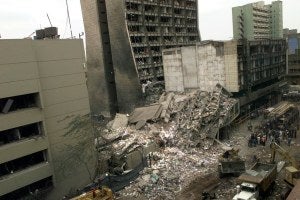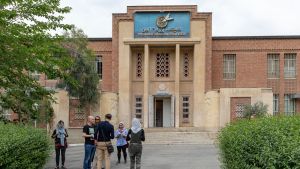Lessons in Security and Diplomacy 25 Years After the US Embassy Bombings
 Play Podcast
Play Podcast
About the Episode
Deep Dish revisits the haunting morning of August 7, 1998, when al-Qaeda struck US embassies in Kenya that claimed over 200 lives and left thousands wounded. Ambassador Prudence Bushnell, who was present during the attacks, and former foreign service officer Mietek Boduszyński, who served in Libya when US facilities in Benghazi were attacked, reflect on how the US government should balance diplomacy and danger, whether the right lessons were learned, and what challenge face US diplomats in today's risky world.
-
Terrorism, Betrayal, and Resilience: My Story of the 1998 U.S. Embassy Bombings, Prudence Bushnell, Potomac Books, October 1, 2018
-
Public Diplomacy and the American Fortress Embassy, Mietek Boduszyński, Pacific Council on International Policy, February 13, 2019
-
Diplomacy Doesn’t Work in a Zero-risk World, Elizabeth Shackelford, Chicago Tribune, November 4, 2021
[Lizzy Shackelford: INTRO: How did that This is Deep Dish on Global Affairs— going beyond the headlines on critical global issues. I’m your host, Lizzy Shackelford, with the Chicago Council on Global Affairs.
On the morning of August 7, 1998, 25 years ago this month, this was the leading story.
(SOUNDBITE OF UNIDENTIFIED REPORTER) “Large explosions hit the US embassies in Kenya and Tanzania this morning.”
The terrorist organization al-Qaeda set off nearly simultaneous truck bombs and the explosions reduced the five-story concrete-reinforced US Embassy building in Nairobi to rubble. More than 200 people were killed and 4000 wounded. 12 of those killed were Americans.
(SOUNDBITE OF LIVE FOOTAGE)
The attacks were shocking. The horrors of transnational terrorism targeting American interests, and those around us, hit the diplomatic community three years before the 9/11 attacks would bring this reality home to the United States. These attacks also changed the way America engaged in the world, with dramatic security protocols developed to keep America’s embassies and personnel safe. So, did we learn the right lessons from these bombings? What should the US government have done differently before, and since? And what is it like for US diplomats to do their work in today’s risky world?
Here with me to discuss we have Mietek Boduszyński who teaches US foreign policy at Pomona College and was a career Foreign Service Officer who served in Albania, Kosovo, Japan, Egypt, Iraq and in Lybia when the US facilities in Benghazi were attacked. He just concluded a year appointment at the Pentagon working for the Undersecretary of Defense for Policy as a policy advisor on civilian protection.
We are also honored to have Ambassador Prudence Bushnell. Ambassador Bushnell was a career Foreign Service Officer for over 24 years serving around the world and facing some of America’s hardest diplomatic challenges of that period. This included serving as America’s Ambassador to Kenya when the 1998 attacks occurred. Ambassador Bushnell was at a meeting at a building across the street at the time – she sustained injuries herself but carried the embassy community through the aftermath and wrote about her experience in her book, “Terrorism, Betrayal, and Resilience: My Story of the 1998 U.S. Embassy Bombings”.
Now, every American recalls where they were and how they felt when the September 11th attacks happened, but the 1998 attacks didn't register with most, even though they really were precursors to that event. Ambassador Bushnell describes that moment in Kenya as the bombs went off around her....]
Ambassador Prudence Bushnell: I had never experienced near death, and I will never forget it, because there was this dreamy feeling as the, building shook. I was on the 21st floor, and I was pretty sure it was going to collapse, so, dreamily I thought, I'm going to die, while every cell in my body was struggling to hold on to something, and fortunately for me, the teacup next to me stopped rattling, and I went down twenty-one flights of stairs, having absolutely no idea what was happening outside. All I wanted to do was get to my embassy in the medical unit, and it was only after I came out and saw the melted back end of my embassy, the rubble of another building that had pancaked and charred human bodies on the ground. People who had been walking by who were instantly incinerated by the truck bomb, and I knew no one was going to help me. I'd better get myself in gear, and I did.
Lizzy Shackelford: How did that change your work and your engagement as a diplomat after that experience?
Ambassador Prudence Bushnell: I had never personally or professionally encountered such sadness and anger. I did not know that I was personally capable of such anger. And because of the way we responded in the embassy immediately after the bombing, which is according to protocol, our Marines came out with their guns to provide security protection. That was what we needed. What thousands of Kenyans saw as they poured into that urban street corner I mean, people bloodied in the chest and head wandering around, others on top of rubble struggling to get those who are still alive out, and white American men pointing guns at them. They had righteous anger. I understood it and it was my job as the face of the United States and as the US Ambassador to listen to that anger and to accompany not only my colleagues and the people in our embassy who became their own first responders, but to accompany the people in Nairobi who were so terribly hurt, physically and economically until we came out the other side. So, I learned empathy. I also learned what a mentor had advised me when I became ambassador was the most appropriate action to take. That advice was, take care of your people, and the rest will take care of itself. That became my leadership mantra, my leadership philosophy, and my leadership strategy, not only for the remainder of my time in Kenya, but when I went on to become ambassador to Guatemala and then dean of leadership and management school at the Foreign Service Institute. Take care of your people and they will take care of the rest.
Lizzy Shackelford: Incredibly good advice. Mietek, you've also faced the risks personally as a diplomat. You were posted in Libya during the Benghazi attacks in 2012. Can you talk about that experience and how it shaped your work?
Mietek Boduszyński: I was in our embassy in Tripoli and the attack happened at a small facility we had in Benghazi, about 500 miles away. I was actually scheduled to be with ambassador Stevens, my boss, the ambassador that was killed in that attack on that day and changed my plane ticket at the last minute for logistical reason. I still have to this day, the original plane ticket going on the day of the attack. So, that logistical reason saved my life. I did experience the injured, colleagues coming back to Tripoli and of course the bodies of Ambassador Stevens and the other colleagues, that were killed that day. So, that was my closest kind of experience with what the ambassador described, but not nearly as close and comparable. But just the chaos and the uncertainty and the sadness that followed, I stayed on in Tripoli at the embassy with a small group of officers -- I was the public affairs officer, so, I was on the country team. Many people got evacuated or left the country after that. And we were told that the mission will go on and keep in mind that the context is a little bit different because the attacks were in a different place far to the east of the capital, security circumstances at the time were different. Unfortunately, I think the distinction with the attacks in East Africa is that extreme politicization of the event in Washington and how that affected our mission. And basically, we struggled to continue operating diplomatically, even though we were told by the Obama Administration at the time that the mission will go on. And so, my reaction was to double down on my engagement as public affairs officer, which you know, frankly speaking was very difficult given the political context.
Lizzy Shackelford: Many Americans don't understand the risk and often the trauma that diplomats face working in these types of circumstances. The State Department has really tried to start addressing trauma and mental health impacts more. When war broke out in South Sudan and Juba, when I was there, I recall after I evacuated, the only move anyone made was slipping a note under my door of saying, hey, if you need to talk, we've got a regional medical officer. I remember thinking that was probably not quite sufficient, but I'm very curious, Ambassador Bushnell going back to your experience 25 years ago was trauma and the care of the staff afterwards even on the radar of headquarters, I mean, you said that you prioritize taking care of your people, but was that something that the State Department knew how to address at the time?
Ambassador Prudence Bushnell: No. We did have a regional psychiatrist in South Africa who hopped on the airplane as soon as he heard about the bombing and, was a huge help. What I found is that people experience trauma differently, and I might as well wish my brown eyes blue as to wish people experienced the same way or could do it in such a way that strategy A, B, and C would overcome what they were feeling. Unfortunately, it didn't. One of the things that we did very early on Has subsequently become somewhat controversial is to have a briefing session. I had every single person who was in the embassy at the time it was blown up over to the residents in small groups with counselors to talk about where we were, what happened, and how do we feel now. I thought it helped, but then I was the ambassador, and so, when you're at top, you're experiencing things quite differently from others. I had decided I would not going to segregate Kenyans and Americans. I think it was rather awkward for people to speak. But what was important to me was that it was giving people the opportunity. a few months later, I had one person walk into my office and say, Ambassador, you've got a problem, which, of course, is what I live for every day. There are people in this mission who are not taking what happened seriously. They're trying to move on. A lot of us, are not ready to do so. You need to do something. Literally two minutes later, the people of whom this person was speaking walked in and said the same thing. Ambassador, you've got a problem. You've got someone who is absolutely stuck and can't move on. You need to do something. So, what I did was to call in a smorgasbord of opportunities to create. And what I found that worked almost better than, counseling because Kenyans in particular were just not accustomed to the American form of psychiatric and psychological interchange. Was very helpful was sending people from the Foreign Service Institute and having people focus on personal skills. Where am I going with my career? Something that could bring us back to a sense of normalcy, and most importantly, the sense that you are important. That was not done in the State Department.
Mietek Boduszyński: You know, even 14 years later when I left the department, the first time initially resigned partly because of the intensity of that time in Libya, and then decided to change my resignation to leave without pay, which is a way by which officers can leave for a while and come back. But in either case, I never heard from anybody, and I never got a phone call asking how I was, you know, for those of us who stayed in Tripoli, there were some visits, by senior officials in the Regional Bureau of Near Eastern Affairs, that talked to us about morale issues. But there was never any kind of, uh, systematic psychological help offered. Of course, I think it was available. We had sought it out, but there was never any exit interview or anything like that.
Lizzy Shackelford: Yeah, I think the State Department still has a long way to go on that front, so turning to the security issues more directly Ambassador Bushnell, you've written that there were signs of risks to the embassies prior to those attacks in 1998, but that the government didn't do enough to mitigate those risks. Can you talk about what risks you were aware of beforehand and what you think the US government could or should have done sooner?
Ambassador Prudence Bushnell: Well, it took me a nanosecond my first day in the office to see what the risk was because there was absolutely zero setback from a very busy street. A street corner that was, directly opposite a commuter railroad station. So, we had people flooding by sidewalk. You would go up five steps and you're looking at post one, the Marines. The State Department was going to invest considerable funds into refurbishing the building. I went back and I said, look this does not meet our own security standards. Let's put the money you're going to invest in a fund, sell the building and buy a lot and build a new building someplace else. And they came back and said that train has left the station. Be quiet. Goodbye. I subsequently, because we were in such a congested area of Nairobi, we we're among the first to experience the rise in crime, pickpocketing, et cetera, and more violent crime and the rise in political violence as elections came and went. At one point, I counted gas masks to see if there was enough gas masks in the visas section to give to the applicants because there was so much tear gas coming in from outside. I was also sending reports back to the department about a risk of a bomb and then assassination attack we were under from an Islamist non-governmental organization near the Somali border, which Kenyan intelligence said had links probably to Bin Laden. I reported that back to the department. Heard nothing, except that intel agency said, would you please let this play out to see what happens. Well, excuse me. I'm the person who is personally responsible for the safety of Americans in country. And it got to the point when I said, that's it. I asked the President of Kenya to get these people out of Kenya and he did. To great outcry in the press, reported that back to Washington. Then, when I was back for Chief of Mission conference in December of 1997, a colleague of mine took me aside and told me that I needed to stop nagging about security, that the sixth floor, that is the people at senior management, were getting really, really irritated and stop it. When I returned with that piece of advice ringing in my ear, I was told that during my absence, the embassy had a walk in. A man walked in and said, you need to be aware that you are going to be attacked, and it is likely to be a truck bomb. That was fed throughout different intel communities and came back and said, Ambassador, the guy's a flake. Don't worry. I reported that. Then I was written up in my need improvement section during the annual performance evaluation, and that was the point at which I said, that's it. I am writing the Secretary of State because on the record, I want everybody to know what is going on here. I wrote the Secretary, and I did not get a response from her. I frankly didn't anticipate one. And three months later, we were blown up.
Lizzy Shackelford: That is horrifying, and yet it does sound familiar to some of the warning signs ahead of the 9/11 attacks that were, not taken seriously as well.
Ambassador Prudence Bushnell: Well, yeah, unfortunately, I learned two lessons. Number one, if you're going to be attacked, don't do it during the month of August when Congress is out of session and the media is on vacation. Number two, if you ever have a President of the United States in a complicated, convoluted sex scandal, you can better believe that everything else takes second notice. The media, the government, Congress were so involved in that sex scandal that there was no air or room for anything and nothing was done. No congressional review, no after action, nothing. With the exception of the Mandatory Accountability Review Board that came to Nairobi to determine what we had done wrong.
Lizzy Shackelford: Now, Mietek, looking, many years later, how much of this sounds familiar or how much do you think was improved by the time, we saw the attacks in Libya?
Mietek Boduszyński: So, here we have a generational contrast. By the time I started the Foreign Service in 2004, the pendulum had swung, I think, pretty firmly the other way. My very first post in fact, embodied that they were just building a new embassy compound, and when I started, I had, believe it or not, office with an opening window at a US Embassy, which I don't think exists anymore, anywhere. And then by the second year of my tour, I was in a very different kind of building. this was Albania. So, a country that is very friendly to the United States, where there's some certainly organized crime and corruption, there's also been some extremist activity at points. I was a public diplomacy officer, again, there were parts of the country that were off limits to us, without much explanation, or any explanation for that matter. And so already there, I saw the tension, between mission and security and sort of the risk aversion, a zero-risk acceptance that had already crept into the culture, in diplomatic security.
Lizzy Shackelford: So, I'm very curious because I experienced that side of the pendulum as well coming in, well after these attacks. In your experience, Mietek, because you then again, in Libya did see serious vulnerabilities for our personnel. Which of those protocols that had been in place by the time you were launching your career as a diplomat, did you find reassuring and helpful and effective? And which ones were just obstacles?
Mietek Boduszyński: Well, certainly, having an embassy that has adequate setback and adequate perimeter walls and has adequate access, procedures and so on. All of that is extremely important. But I think that mentality of zero-risk about keeping people inside the embassy safe also then creeps into how we do our external movements, for instance, where we can go and how we go and who we can meet with, and the determination of what movements are allowed or not. That's where it becomes a much grayer area, I think, where the same approach that led to the fortification of embassies then, unhelpfully, translates into external engagement.
Lizzy Shackelford: Ambassador Bushnell, what do you think were the right lessons that were learned after the attacks in 1998? And which ones do you think were still missing?
Ambassador Prudence Bushnell: I'm sympathetic to decisions to move out of central cities and have a considerable offset because it saves the neighbors. As well as ourselves. I think that we have gone much, much too far in looking at ourselves as potential victims of terrorism. The fact of the matter is, we who do business without guns understand, and I think most of us understand, that we are going into dangerous business. We all go through security training, when I joined the Foreign Service, people were being kidnapped and taken hostage. And the security, I will never forget this, the security man said, don't worry, it used to be the Italians were kidnapping us. Unfortunately, that doesn't happen anymore. People from the Middle East are kidnapping us. Their diet is different. If you don't like what they eat, don't worry about it. Don't eat it. You'll be amazed how good it will taste after five days. So that's, those are the kinds of very, practical advice we were given as we went into what we understood was potential crises. However, let's not invent them and pretend that which doesn't exist does exist. I think the pendulum went way, way, way too far. And I can tell you, having done business in Guatemala with nine bodyguards, because the first terrorist attack against an ambassador was in Guatemala City in 1968, that you actually can go out to the countryside and do external work. It's possible, but it depends on your attitude and how, even if you have to go with bodyguards, how do you present yourself? With friendship or with fear?
Lizzy Shackelford: Think you put it well with that. You've also worked in the field as an academic, which is a very different way of engaging with countries and communities than as American diplomats often are able to. How did that shape your view of how US diplomacy is being conducted today?
Mietek Boduszyński: Well, I think it reinforced for me that, American diplomats in many countries, even countries that we don't immediately think of as dangerous, often, live in bubbles and they're unaware of what's going on. So, as an academic, of course, I'm going to have greater freedom than a diplomat. So that's understood. It's an unfair comparison in a way, but at the same time, I was struck by when I did some academic field work in various countries Egypt, for instance, or last year, Kosovo and then I went to meet with some people at the embassy, to talk to them about my research as well. I was sometimes struck by their lack of awareness of certain political dynamics, for instance. And I've heard this also from journalists that I've interviewed for my own research. One journalist who was a very prominent, journalist in covering West Africa, for several years, for instance, told me that he no longer relies on American diplomats as sources. It's the opposite.
Ambassador Prudence Bushnell: Ouch.
Lizzy Shackelford: Right? It's probably pretty terrible to hear that Ambassador Bushnell, because you in your time, the US Embassy was one of the best sources of information of what was happening. So, you know, we've talked about the need to balance the risks, which are very real, with the ability to do our jobs. Ambassador Bushnell, you mentioned being out there with friendship rather than fear. What are some other ways that American diplomats can be more effective, even with these restrictions?
Mietek Boduszyński: So, of course, compared to the time that the Ambassador was Ambassador in Kenya to even the time that I worked in Libya, and even to the time I worked in Iraq a few years after that, technology has made all kinds of things possible. Especially video conferencing and so on. It's not a substitute for face to face engagement, and we should never think of it as one, but that's certainly one, way to do diplomatic engagement, if all else fails. And, you know, we've seen the rise of these missions’ kind of in exile and embassies in exile, after bouts of instability in various countries. Most recently, I think the US Diplomatic team in Khartoum, Sudan, moved to Jeddah, Saudi Arabia, if I'm not mistaken, and then are conducting the diplomacy from there. sometimes, you know, that's not necessarily A terrible thing, of course, limits to the audiences you can reach, but sometimes I've heard in my research, also diplomats say this to me, that they actually met more, people from that country in the neighboring country than they did when they were, trapped on a fortress.
Lizzy Shackelford: That's actually very much my experience serving the US mission to Somalia. When I was in Mogadishu, I was limited to whoever could get into the military compound that I was stranded in. But when I was in Kenya, many Somalis were traveling and passing through, so I could often have more open and engaging conversations with a wider range of Somalis when I was in Nairobi.
Mietek Boduszyński: You know, there's also an internal bit to this internal to the state department and that's negotiating with security at posts, especially outward facing officers, political, economic, public diplomacy, and so on. And so, I faced this challenge, especially in my final foreign service post in Iraq, which was already a fortress like environment for a very long time. And so, they're, getting to know diplomatic security managers, getting to know the contract bodyguards, explaining to them what my mission was and why it mattered was really important. It's sort of internal diplomacy, right? So, you can do external diplomacy.
Lizzy Shackelford: Ambassador Bushnell, what do you think are some coping mechanisms that US diplomats today can use to try and be more effective despite the risk protocols that they have to face?
Ambassador Prudence Bushnell: I think that it is an opportunity for every single mission to be innovative and creative. you take your mission, and then you look at your vulnerabilities and your threats, and you determine how you can accomplish your mission within the vulnerabilities and threats. If you cannot, then you either change, then you change the mission, for heaven's sakes. Secondly, when it comes to being innovative, it is amazing what you can come up with, and I will give you an example. In Guatemala, we were there to help implement the peace accords, which was an incredibly different social contract from the one Guatemalans had been under. How did we come to get Mayan people and Ladino people together and agree? Well, we did things like a trade delegation of Mayan commercial people to the United States, and then we invited the ever very powerful, Ladino head of commercial organization together with the Mayan people to interact. So, we used the residents. Music it is incredible what one can accomplish with music. We did West Side Story using all Guatemalans players. First, we were told, no, no, Guatemalans don't sing and dance. Excuse me, everybody sings and dance. It was such a success, we did another, play like that. I would invite people who would ordinarily kill each other. To come and listen to marimba bands, opera, whatever, listen to music that I would have at the residence. And I actually got a human rights activist together with a military man who came back later to have lunch and neither of them killed the other.
Lizzy Shackelford: I think the power of an ambassador's ability to draw people to the residence or to events is a really useful tool for US Diplomacy. Since 9/11, we've really tried to engage more in expeditionary diplomacy and in particularly dangerous places. There've been more war zones where we've tried to have missions than really ever before. Do you think that it's wise to send diplomats into conflict zones and what are the risks and rewards of doing so?
Mietek Boduszyński: The mission has to be clear and has to be explained to American diplomats going to those places. If they're just there to be there, so we can say that we have a presence there, you know, then maybe they should be told that, and that should be explained to the taxpayer, why that's a worthy enterprise. But if they're told that they're going there to do reporting on local political developments or the economic situation or to do public diplomacy engagement, then resources and security protocols need to be matched to that mission. Often that doesn't happen. These fortress embassies become sort of self-serving, I'm thinking of places like former embassy in Kabul and Baghdad and Basra where I was in Iraq it needs to be rationalized, and chiefs of mission and deputy chiefs of mission need to be empowered to have some flexibility, to make determinations, the idea that the only external engagement that can be done, and that's mission critical is an impossible threshold to meet, especially in public diplomacy, for instance, right? I'm justifying that for the security folks is impossible. Otherwise, these places where that become again, sort of sort of a self-serving towns or cities as, as you call them with no way to rationalize them for diplomacy, much less for the vast amounts of taxpayer money that go to fund them.
Lizzy Shackelford: Ambassador Bushnell, how do you feel about efforts to have diplomatic missions in active conflict zones?
Ambassador Prudence Bushnell: If we need them, then, as you were saying, we need to change the rules. US Ambassadors are to my knowledge, the only Senate confirmed individuals to get a personal or machine signed letter from the President of the United States saying you are personally responsible for the safety of people under your purview, with the exception of military command. Well, you put somebody in a conflict zone and give them a mission to do outside reporting, by the way if anything goes wrong, you will be held personally accountable. So, let's decide what the mission is and then let's again, look at the threats, vulnerabilities, and create a bureaucratic context in which doing such business is possible, rewarded and the person is taken care of afterwards.
Lizzy Shackelford: Ambassador Prudence Bushnell, author of Terrorism, Betrayal, and Resilience, My Story of the 1998 US Embassy Bombings, and Mietek Boduszyński of Pomona College, thank you both for joining me today for a discussion that is close to my heart about embassy security and what it's like to represent America in a risky world.
Ambassador Prudence Bushnell: Thank you.
Mietek Boduszyński: Thank you, Lizzy.
[Lizzy Shackelford: OUTRO: Ambassador Prudence And thank you for tuning in to this episode of Deep Dish.
A reminder that we want to hear more from you, our listeners. So, send us an email or, better yet, a voice memo, to deepdish@globalaffairs.org -- You can suggest issues you’d like us to cover, guests you’d love to hear from, or you can just let us know how you think we’re doing.
And if you are looking for more Deep Dish in your podcast diet? Tap the “follow” button in your podcast app so you get each new episode as it’s released. If you think you know someone who would like today's episode, please "share" it with them!
As a reminder, the opinions you heard belong to the people who expressed them and not the Chicago Council on Global Affairs. This episode is produced and edited by Kyra Dahring and mixed by Frank McKearn from Aphorism Productions.
Thank you for listening. I’m Lizzy Shackelford and we’ll be back next week with another slice of Deep Dish.]






Related Content
 Global Politics
Global Politics
Former American Embassy employee Kathryn Koob answers a minute of questions about Tehran in 1979 in this episode of Wait Just a Minute.
 US Foreign Policy
US Foreign Policy
"The Diplomat" is Hollywood's take on the foreign service. Deep Dish explores the significance with a career diplomat and TV producer.
 Defense and Security
Defense and Security
"Having our embassy shut down and all of our diplomats leave ... does reduce our leverage," Elizabeth Shackelford tells Steve Scully.